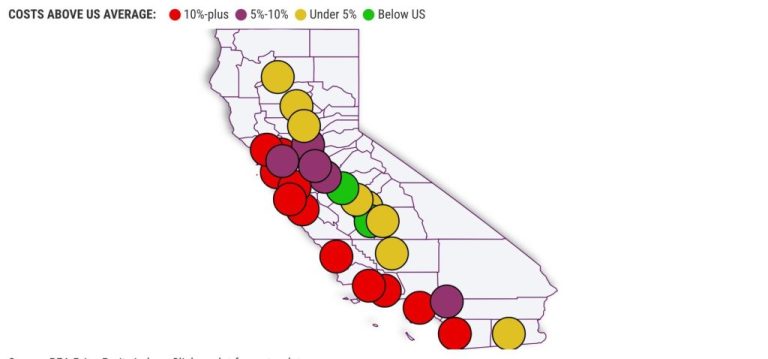
Store owner Arkan Somo wants shoplifters to know this: boost something from one of his family’s San Diego markets, and staffers will call the police.
Weird that that has to be said. But for retailers across the state, the passage of Proposition 36, which will toughen sentences for petty theft and some drug possession for repeat offenders, could usher in a return to normal: reporting crime.
“We have been so powerless over the last few years,” Somo said.
They stopped calling police, thinking it was fruitless and seeing the same person back in their store. Swiping less than $950 in items became a misdemeanor under reforms that voters approved in 2014, and that could often just result in a citation, maybe a trip to a sheriff’s station, but not jail. And sometimes, no criminal charges would follow.
“Before, we gave up. What was the point?” Somo said.
Now, he said, retailers “hope and we anticipate the same criminals cannot walk in and grab whatever they want every day with no accountability.”

He and other retailers herald what they believe will be real change after California’s electorate — 68.4%, unofficial numbers show — voted for Proposition 36, making it the most-backed measure of the 10 on the November ballot.
A decade ago, Proposition 47 raised misdemeanor petty theft from $450 to $950 in value and lowered penalties for simple drug possession. Proposition 36 raises the stakes, allowing for stiffer sentences for repeat offenders. It also creates conditions that could see confirmed repeat offenders taken straight from the store to the jail, the norm long ago.
Now comes the work for police and prosecutors. San Diego-area authorities say they are preparing for a jump in calls reporting petty theft and an associated increase in arrests when the law goes into effect in January. They say to expect more people to be booked into jail — perhaps hundreds more a day at first — and for more criminal cases to be filed. And they hope more defendants will take the opportunity to have their cases handled with drug treatment.
“It’s very exciting that the people so overwhelmingly passed Proposition 36, but what it means now is that we have to have successful implementation,” said District Attorney Summer Stephan, a vocal backer of the measure.
“It’s going to take a lot of work, but we know how to do this and do it together as a community.”
Stephan said her office is already working on getting training for the region’s roughly 5,000 law enforcement officers about the coming change to the law.
‘People have spoken’
But first, many officials said, shopkeepers must report crime. Store and restaurant owner Tony Konja says his staffers will be quick to do so because now they expect the offender will face stiffer consequences.
“I think the message needs to be sent that people have spoken and that we’re sick and tired of all this going on,” said Konja, who owns Keg N Bottle and KnB Bistro locations throughout the region.
Konja is also the vice chair of the board of the Neighborhood Market Association, and he’s pressing other members to more quickly call police.
As it stands now, police and deputies respond to reports of petty theft. They can issue a misdemeanor citation — which to a layperson might look like just giving a ticket — and maybe take the suspect in to be fingerprinted. But without additional circumstances in place, generally, the suspected thief is not immediately booked into a county jail.
Proposition 36 makes going straight to jail a real possibility for small-time repeat offenders. Someone with two prior petty theft convictions — prior arrests for theft are not enough, it’s got to be findings of guilt in court — can be charged with a felony on the third petty theft case, no matter the value of the property stolen. And since it’s considered a felony, suspects can be booked right into jail. (Proposition 36 will also allow prosecutors to add up the total value of items stolen in multiple, unrelated thefts and charge them as one felony if the combined total is more than $950.)
For the Sheriff’s Office, deputies will check to see if the suspect’s record shows two prior theft convictions and if so, they will be taken right to jail, Sheriff Kelly Martinez said.
San Diego police Cmdr. Shawn Takeuchi said the department is still shaping its planned approach. “As we move forward, we will be consulting with our legal advisors to really get a true understanding and come up with a process so that we are following the intent of Proposition 36,” he said.
But for offenders to get those first two petty theft convictions on the books, thefts have to be reported and prosecutions have to follow.
Takeuchi said earlier this month he thinks more reports of petty theft will start coming in, noting that there is simply a lot of public awareness of the coming law change.
Martinez agrees, and said she believes thefts have been underreported in recent years.
The San Diego Association of Governments, which tracks the region’s crime data, reported that larceny, or theft, dropped 4 percent from 2021 to 2023. But under the umbrella of larceny is shoplifting, reports of which jumped 25 percent over that same period.
“I’d really first and foremost, like to urge business owners to report the crimes and then follow through if an arrest is made, follow through on the prosecution of the suspect, just so that we can hold people accountable and and really have an effect on crime in our communities,” Martinez said.
She anticipates more arrests will follow. And that means more people taken to the county jails her office runs — and not just on suspicion of theft, but for simple possession of “hard” drugs as well, which was not common practice under Proposition 47.
“We’re guessing maybe 400 more people in custody at a time, but we really don’t know,” Martinez said, adding that her office will closely track the numbers as they try to anticipate increased staffing needs.
“We expect not only will more people be booked, but people will stay in jail longer as they’re going through the court process, because the consequences are more severe for a lot of these crimes,” the sheriff said.
The changes in Proposition 36 will allow a person’s third drug possession case — so-called “hard” drugs like fentanyl, heroin, methamphetamine and cocaine — to be charged as a felony. And that will now bring a new option: mandated drug or mental health treatment. Completing the treatment program allows the person to avoid jail and have the felony expunged. A fourth conviction for possessing hard drugs could mean prison.
Before the law goes into effect, Martinez said, she anticipates releasing to all policing agencies in the region new local guidance regarding which crimes can land someone a booking into a county jail.
“The things in Proposition 36 that are now felonies will all be bookable,” Martinez said.
She anticipates that the increased populations in the jails will initially be high, then will drop and level out.
“I think the jail system certainly is one of the areas that are going to be the most impacted, but I’m hoping that it will bring a sense of relief and more of a feeling of safety for our business community in particular, who’ve really been suffering under these lack of penalties for mostly theft cases,” Martinez said.
‘Fully shifted to implementation’
Prosecutors are also readying themselves for more cases under Proposition 36.
The district attorney said she anticipates a busy start in the first half of 2025 for prosecutors handling cases made possible under Proposition 36. But she also suspects the caseload will return to normal or even drop as repeat offenders start facing more serious consequences.
“What we’re doing now is we’re recycling the same people with no pathway out of the criminal justice system,” Stephan said of the current approach. “We’ve got people deep into their substance use, and they keep getting citation tickets. We file charges, they fail to appear and essentially nothing happens.”
She expects the combination of facing felony charges and incentives to seek treatment will have a deterrent effect.
Stephan said she’d like to see open slots in Drug Court — which is less than two-thirds full, she said — perhaps be used for people now facing tougher charges under Proposition 36.
She also said money from Proposition 1 could help. Passed by voters during the March primary, it authorizes bond money for behavioral health beds, supportive housing and more, including in-patient treatment for people with substance-abuse disorders.
Opponents of Proposition 36 argued it could result in putting more people in prison and paying for it with money earmarked for rehabilitation and mental health programming.
The Legislative Analyst’s estimate indicates the measure will cost the state “several tens of millions to the low hundreds of millions of dollars” each year, primarily because more people will be sent to prison. It estimated local jurisdictions will probably spend tens of millions a year toward county jails, probation supervision costs, and in the court workload for mandated mental health and drug treatment.
The analysis noted that the money that Proposition 47 saved by reducing penalties was spent on mental health and drug treatment, school truancy and dropout prevention, and victim services. Last year, that was $95 million. Proposition 36 would reduce those savings, likely in the low tens of millions of dollars.






